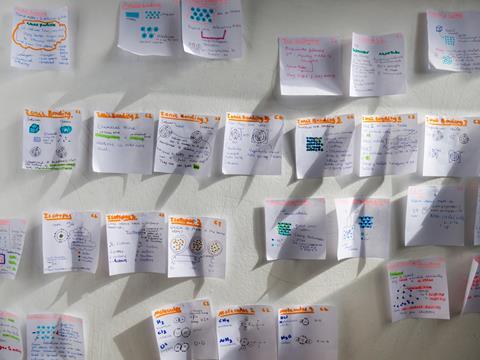The rights and wrongs of exam preparation
Preparing for school exams is a stressful time in any student’s life. So whether they’re studying for GCSEs, Nationals, A-levels or Highers in the UK, the French baccalauréat or the Finnish Matriculation exam, how are students revising, and what is the current advice on best practice for chemistry students?
Exam revision is a really general term and, without guidance, many students find it hard to know where to start and even harder to work out whether they are doing the ‘right thing’. Revision is about two things: knowledge and exam practice, and both are needed for exam success.
Global advice

There are many revision techniques and strategies to help students learn all the information that they need. Broadly speaking, the advice given to students between the ages of 16 and 19 who are preparing to take exams in top-performing countries is similar, with the majority recommending the use of MOOCs, comprehensive syllabus information and best practice informed by cognitive science. However, students preparing for the National Higher Education Entrance Examination (or Gaokao) in China have a very different experience.
In China, each school province sets its own syllabus and exam papers and schools are expected to be the primary provider when it comes to revision. That means additional classes, mock-exam sessions and teacher-led self-study periods. The result is an exhausting day that often begins at 8am and finishes 12 or 13 hours later.
Best practice
Arguably, the most important strategy is starting early enough. Students need to start sufficiently in advance of the exam to allow enough time to cover all the material. Katherine Shaw, whose job at Reckitt Benckiser involves supervising year in industry students, says ‘the best trick is to write a revision timetable and stick to it.’
Starting in good time, students have time to prepare properly, test and retain the information reviewed, and evaluate and improve their performance. Getting going early is particularly important for fact-heavy subjects like chemistry, in which students are expected to know a lot of detailed and specific information relating to a wide range of topics. Starting late and cramming can translate into underperforming and being unable to retain facts long term.
Even when students do start early enough, there’s still the method to worry about. Breaking down topics into manageable chunks, spacing out learning, going over topics periodically and varying the subject are good approaches; a timer like Pomodoro can help. Giving up if a topic is difficult or not interesting isn’t an option, but varying the topic can help.
Posters of essential facts

The practice of dual coding, the combining of visual and verbal material, is probably the most well-known revision technique, with knowledge organisers, bullet-point lists, posters, flash cards, revision clocks and even bunting! Although here the advice is clear, don’t just go through notes with a highlighter pen. Unless students interact with learning materials it is unlikely they will learn anything. The current year 13 students at Bolton School suggest rewriting class notes, practising calculations and mechanisms, and watching videos on specific topics.
Having a good grasp of the underlying scientific principles is a sound approach. For example, understanding how reaction mechanisms work makes them easier to elucidate. ‘Trying to memorise them is not the best way at all. One slight change in the exam paper and your brain won’t be able to work out what to do,’ says Katherine. ‘Learn the principles so you can handle anything that comes up.’
Practice makes perfect
Once students have worked through topics they need to practise recalling information, and here there is a wide range of options to suit everyone. Maire Gorman, associate lecturer at Aberystwyth University suggests taking a blank sheet of paper and writing down everything the students can remember on a given topic in five minutes before filling in any missing information. Doing this regularly it’ll become easier to recall the details.
Edtech has perhaps heralded the most recent advance in exam revision. Adaptive learning services, such as those offered by Seneca and Tassomai, make it easy for students to practise knowledge retrieval with questions tailored to suit the specific exam syllabus they are following.
Revising while observing Ramadan
Ramadan runs from 5 May to 4 June this year, so Muslim students need to consider fasting when planning their revision. While fasting, stay rested and take regular breaks from revision. Eating healthily and rehydrating is essential.
Past paper practice also forms a crucial part of exam preparation. Students at Bolton School advise working through past papers in detail and doing timed questions. Both of these techniques can help students to identify the areas in which they are weaker, so they can concentrate and spend extra time revising them to ensure they have as good a breadth of knowledge as possible.
‘I’ve spoken to a lot of students who run out of time in exams,’ says Timothy Easun, research fellow at Cardiff University, adding, ‘The common theme is that they go meticulously through past papers, taking hours to understand and get it all right. This seems to mean that they train themselves to answer exams slowly.’
Student well-being
The last piece of universal advice is for students to take good care of themselves. If students are well rested, well fed, and take regular breaks, they are more likely to be effective learners.
Inevitably, the exam period is an anxious and stressful time. Each student will find different methods effective and, although using a range of techniques is likely to be the most successful in the long term, each student needs to find what works for them.
Vikki Cantrill is a freelance writer and editor based in Cambridge, UK and tweets @Vikki_Cantrill














No comments yet